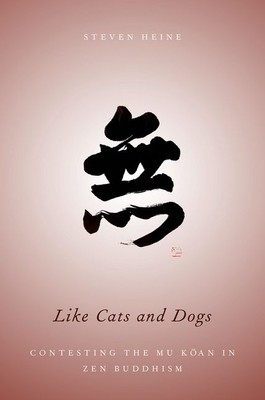
- We will send in 10–14 business days.
- Author: Steven Heine
- Publisher: Oxford University Press, USA
- ISBN-10: 0199837309
- ISBN-13: 9780199837304
- Format: 15.5 x 23.1 x 2.3 cm, softcover
- Language: English
- SAVE -10% with code: EXTRA
Reviews
Description
Koans are dialogues that stand at the center of Zen Buddhist literature and are often used to provoke the "great doubt" in testing a trainee's progress. The Mu Koan consists of a brief conversation in which a monk asks Master Zhaozhou whether or not a dog has Buddha-nature. According to the main version, the reply is "Mu" literally, "No," but implying the philosophical notion of nothingness. This case is widely considered to be the single best- known and most widely circulated koan record of the Zen school that offers existential release from anxiety to attain spiritual illumination.
In a careful analysis of the historical and rhetorical basis of the literature, Steven Heine demonstrates that the Mu version of the case, preferred by advocates of the key-phrase approach, does not by any means constitute the final word concerning the meaning and significance of the Mu Koan. He shows that another canonical version, which gives both "Yes" and "No" responses, must be taken into account. Like Cats and Dogs offers critical insight and a new theoretical perspective on "the koan of koans."EXTRA 10 % discount with code: EXTRA
The promotion ends in 19d.17:39:31
The discount code is valid when purchasing from 10 €. Discounts do not stack.
- Author: Steven Heine
- Publisher: Oxford University Press, USA
- ISBN-10: 0199837309
- ISBN-13: 9780199837304
- Format: 15.5 x 23.1 x 2.3 cm, softcover
- Language: English English
Koans are dialogues that stand at the center of Zen Buddhist literature and are often used to provoke the "great doubt" in testing a trainee's progress. The Mu Koan consists of a brief conversation in which a monk asks Master Zhaozhou whether or not a dog has Buddha-nature. According to the main version, the reply is "Mu" literally, "No," but implying the philosophical notion of nothingness. This case is widely considered to be the single best- known and most widely circulated koan record of the Zen school that offers existential release from anxiety to attain spiritual illumination.
In a careful analysis of the historical and rhetorical basis of the literature, Steven Heine demonstrates that the Mu version of the case, preferred by advocates of the key-phrase approach, does not by any means constitute the final word concerning the meaning and significance of the Mu Koan. He shows that another canonical version, which gives both "Yes" and "No" responses, must be taken into account. Like Cats and Dogs offers critical insight and a new theoretical perspective on "the koan of koans."

Reviews